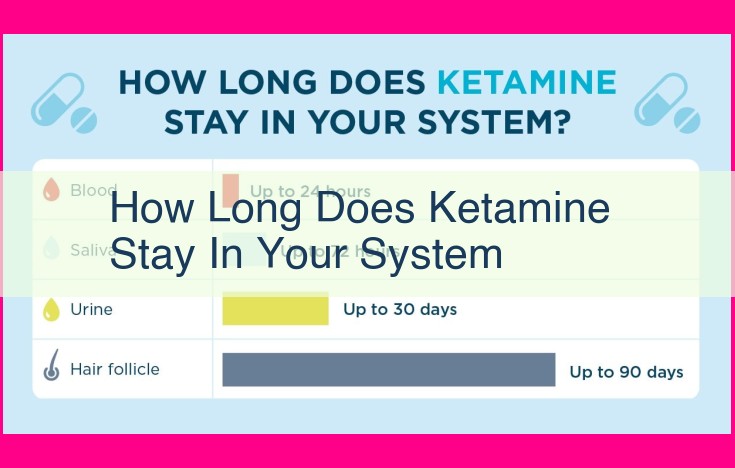Ketamine Detection: Duration In Urine, Blood Tests, And Factors Influencing Detection Window

Ketamine, a dissociative anesthetic, can be detected in urine for up to 2-7 days after use, depending on the dose and frequency of administration. Urine drug tests analyze drug metabolites excreted in urine, providing a non-invasive method of detecting drug use. Blood tests, on the other hand, measure drug levels in the bloodstream, offering a more accurate indication of recent drug intake. Ketamine is metabolized in the liver and kidneys, with its metabolites excreted in urine. Drug interactions or other factors affecting metabolism can influence the detection window in both urine and blood tests.
Urine Testing: A Non-Invasive Tool for Detecting Drug Use
Urine drug tests are a widely used, non-invasive method for detecting drug use. These tests analyze urine samples to identify the presence of specific drug metabolites, which provide insights into recent drug consumption.
The effectiveness of urine drug tests depends on the type of drug being tested and the time lapse since drug intake. Generally, urine tests can detect drug use within a week or two after ingestion. However, certain drugs, such as cocaine and amphetamines, have shorter detection windows.
After drug ingestion, the body metabolizes the drug and excretes its metabolites in the urine. The metabolic pathways of drugs can vary, influencing the detection time and accuracy of urine tests. For example, heroin is metabolized into morphine, which is detectable in urine for up to 48 hours after the last heroin use.
Drug interactions can also interfere with the accuracy of urine testing. Certain medications, such as antibiotics, can affect drug metabolism and alter test results. Therefore, it is important to disclose any medications you are taking when undergoing urine drug testing to prevent false positives or negatives.
Understanding the principles of urine drug testing enhances its effectiveness as a reliable tool for detecting drug use. Healthcare professionals can utilize this information to make informed decisions regarding patient care and monitor drug use patterns in various settings, including workplaces and addiction treatment programs.
Blood Testing: Unveiling Drug Metabolism and Health Insights
As we delve into the world of drug testing, let’s shift our focus from the non-invasive urine testing to the equally valuable blood testing. Blood tests offer a unique window into the intricacies of drug metabolism and overall health.
Uncovering Drug Mysteries through Bloodwork
Blood tests provide a comprehensive snapshot of the body’s response to drugs and their metabolic pathways. They analyze drug concentrations, metabolites, and other indicators to assess drug effectiveness, potential interactions, and overall health. This information is crucial for optimizing drug therapy, monitoring treatment progress and preventing adverse effects.
The Liver and Kidneys: Guardians of Drug Metabolism
The liver and kidneys play pivotal roles in drug metabolism and elimination. The liver, with its remarkable ability to detoxify substances, transforms drugs into water-soluble compounds that can be excreted by the kidneys. The kidneys, in turn, filter these metabolites and toxins from the bloodstream, flushing them out with urine.
Drug Interactions: A Symphony of Effects
However, the body’s response to drugs is not always straightforward. Drug interactions can occur when two or more medications are taken simultaneously, potentially altering their metabolism, effectiveness, or side effects. Blood tests help healthcare professionals identify these interactions and adjust treatment plans accordingly, ensuring patient safety and optimal outcomes.